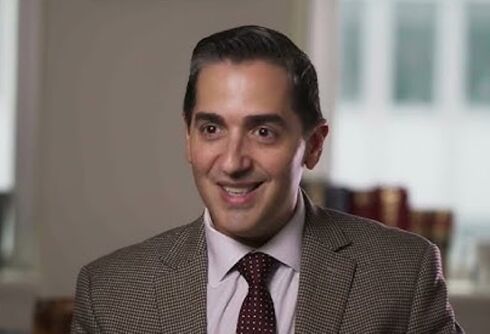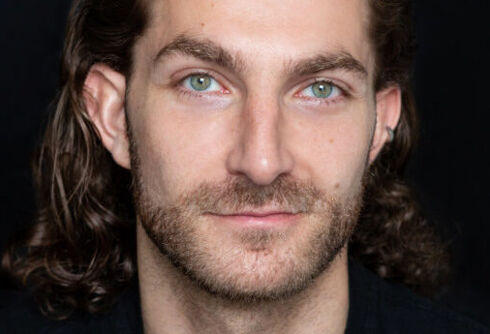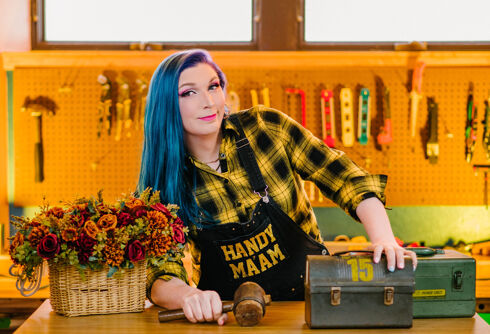Run for Something, the progressive political organization dedicated to recruiting and supporting young candidates running for office down ballot, was founded in the ashes of Hillary Clinton’s losing presidential bid on the day Donald Trump was inaugurated. Clinton campaign veteran Amanda Litman and political operative Ross Morales Rocketto have been helping turn progressive under-40 candidates into winners ever since.
According to National Press Secretary Juan Ramiro Sarimiento, about twenty-five percent of the group’s endorsed candidates for this election cycle are LGBTQ+, reflecting a level of diversity among Gen Z and Millennials not found in older generations.
Related:
Nothing can destroy me: Trans tycoon Anne JKN is a hopeless romantic with a knack for making history
The Miss Universe owner spoke with LGBTQ Nation about her traumatic childhood, her glorious transition, and juggling work and single motherhood.
Sarimiento, who is queer and goes by Juan Ramiro, joined Run For Something three months ago, and, among other duties, is giving voice to the organization’s LGBTQ+ outreach.
Insights for the LGBTQ+ community
Subscribe to our briefing for insights into how politics impacts the LGBTQ+ community and more.
The 29-year-old has interned for Ohio Congresswoman Marcia Fudge (now the U.S. Secretary for Housing and Urban Development), worked with the Democratic National Convention Committee setting the stage for Clinton’s nomination, served as Senior Policy Advisor to the mayor of Kansas City, and served as press secretary for youth advocacy organization Young Invincibles, where he focused on student loan forgiveness.
On a hot afternoon at his home in Lawrence, Kansas, he shared Run for Something’s goals, as well as his own story as a queer kid growing up in the Midwest and Mexico and breaking into politics.
LGBTQ Nation: Run for Something is not primarily devoted to LGBTQ+ candidates, right? It’s focused on younger progressive candidates.
Juan Ramiro Sarimiento: Yeah, so typically our focus is those who are young progressives that are under the age of 40 who are aligned with our progressive values. And we partner with other organizations to increase our diversity, including the LGBTQ Victory Fund.
I recently joined as National Press Secretary, and I’m queer myself, so it’s an issue that’s very close and dear to my heart. We’re living in a very tough moment for LGBTQ rights and you need not look very far to find examples of that. I mean, this year alone over 520 anti-LGBTQ pieces of legislation were introduced, more than any other year on record.
And of those, 220 target the trans community. And at least 70 of these laws have been enacted. So it’s quite a precarious situation. But we’re making some headway in electing some folks.
LGBTQ Nation: What’s your background? How do you come to the organization?
JRS: So I’ve been working in the politics and communication space for over six years. I am a child of immigrants, grew up in the Midwest in Kansas, went to the University of Kansas.
I came to Run for Something because we essentially live in a gerontocracy. The vast majority of people in government are older folks, and so it’s no surprise that the laws that come out reflect something that would benefit them and not necessarily a younger generation, which is more diverse.
I was born in Texas but was raised in Durango, Mexico, which is a very conservative Roman Catholic, landlocked northern state in Mexico. And then we moved back to the United States to Kansas, now a pinkish state, but very conservative, as well.
LGBTQ Nation: Define “pinkish”.
JRS: Yeah, pink in the sense that we have a woman Democrat governor. We have Sharice Davids, the first Native American and queer candidate coming out of there that got elected to Congress, who I love. Sharice is great. And not many people would expect that out of Kansas.
We do have some far-right folks and we have seen some nasty legislation targeting trans folks here, as well, but we also have a contingent of folks that are common-sense and believe that everyone deserves rights. And that’s something that you can point to.
Actually, Kansas is among the states with the most elected women governors in the U.S. Laura Kelly is our third woman governor. Kansas was founded as a Free State advocating against slavery, and it set the stage for the Civil War, really. So it has a long history of fighting for what’s right. And I feel like that sometimes is forgotten because we have had bad representation in the past.
LGBTQ Nation: When did you come out?
JRS: I came out when I was in college. I was a sophomore, so it took me a little while. I mean, I knew I was gay since I was very young. I didn’t have the words for it — I just knew I was different and I knew the social cues. I went to a Catholic school when I was very little, basically all through elementary school, and so very early on I got the message that that wasn’t something that was welcomed in many of the communities that I lived. And so, like many others, I kept it to myself and was in the closet for a while.
Once I got to the University of Kansas — which is in Lawrence, a progressive stronghold in the state of Kansas — I felt differently, and I got to meet different types of people and I felt more free. And so for the first time in my life I felt like I could be myself and live authentically, and it was right after the marriage equality Supreme Court case came down that I felt very moved to see something like that happen in the country. And I felt like I should live my truth.
You had people who were fighting for years to get this case all the way up to the Supreme Court and make a difference for generations to come. And I felt like the least I could do was come out. Not that I owed it to anyone, but rather to just be more authentic and fight for what’s fair without having to hide who I was.
LGBTQ Nation: How did coming out affect your political outlook?
JRS: It very much made me think about what kind of future in politics I could potentially have, and also what kind of limitations and ceilings there were. That was one aspect. And two, it was about if I could live in my state or any part of the country and maybe you have kids one day, have a family. I knew that that was gonna be very challenging in spite of the fact that we had had that momentous decision for marriage equality. I knew that things weren’t going to be magically resolved or that we were going to be accepted simply because of the court case.
So I became inspired to talk about issues that impacted me as a queer kid, really to not just talk about it, but pass concrete legislation that improves the well-being of people.
I have a lot of trans friends from college that I’m very close to, and I’ve seen firsthand how challenging it can be changing your birth certificate. Going through that process, how dehumanizing it can be. Right now, the Attorney General of Kansas, Kris Kobach, who is quite the character on many fronts, he is pushing to undo the work of those folks who have been able to change their registration to reflect their gender identity. So it’s a constant battle, and I’ve seen firsthand here in Kansas how it ebbs and flows, but we don’t have any other choice but to fight.
LGBTQ Nation: What’s on your radar at Run for Something in terms of LGBTQ+ issues? Where do you think the next fight on this front is?
JRS: Well, broadly speaking, we’ve seen some cases in which private business owners have pushed to essentially discriminate against people that they do not agree with. We’ve seen efforts to ban books that share stories about the queer community, to prohibit drag shows and the sort of performances that are very clearly targeting the queer community. And then in schools, you see kids having a tougher time because the school boards that make those regulations and rules that govern schools, how those are not friendly to queer kids.
So we’re working on electing young people, diverse young people to school boards, to library boards, to the City Council, to state legislatures because we know that’s where a lot of things start, and where we can stop them.
In 2022, queer candidates ran in all 50 states and the District of Columbia for the first time, and last year the midterm elections were the most wins for openly LGBTQIA+ candidates ever, so we’re doing everything we can to keep that momentum going and pave the way for a more inclusive, representational and progressive democracy.
LGBTQ Nation: We talk a lot about the effect these discriminatory laws, especially in schools, have on queer kids. What do you think the effect of this climate is on straight kids?
JRS: It’s a layered and complex situation, because on the one hand, you have an inhospitable environment that is teaching some folks, in the same way with racism and other things, that being prejudiced and treating people not like full human beings is somehow acceptable. That’s the wrong message.
But on the other hand, you also have a young generation, both Gen Z and Millennials, that grew up in a different environment, that grew up where marriage equality was the law of the land, where queer representation in media and culture more broadly, and in elective office, has increased to record levels, really. So they’ve seen both sides, and they are seeing it as this “taking away” from what has been a more inclusive society.
And they themselves — I mean, if you look at the polls, young people are more likely to come out at younger ages and at higher percentages, and they’re dating each other younger and coming out at younger ages in ways that I wish I had available. And I’m very happy that that’s the case. And so when they have grown up in that inclusive space, for the most part, this climate is seen as an attack on that. So you could argue that it’s making them defensive of their friends and they see it as a wrong.
Now, are there segments that are gonna get the wrong message? Of course, but overall, it’s younger generations that are more inclusive, and we’re working to get them and encourage them to run for office so that we can harness that energy and that frustration into getting them elected and get them into the rooms where that legislation is made, so they can protect the people that they love and live in communities that are reflective of the values they grew up with, not in this space that is regressive and taking us back.
Young people also have access to information in a way that no other generation has had in the past. They know that queer people — in spite of the book bans that are trying to erase us from history and from society — they know that queer people have been around since time immemorial. There are queer characters in stories and history, and sexuality has not always been this rigid. It has ebbed and flowed and it has been very fluid since ancient times.
And so they know that because they have TikTok, they learn a lot of things very quickly in a short time. They just have a lot more access to information and they’re able to discern what are reputable, credible sources in a way that some older folks don’t. So they’re harder to fool because they’re more educated, they’re more inclusive and understanding and they just didn’t grow up in a space where those things were repressed.
LGBTQ Nation: Looking across the landscape, what gives you hope for the U.S. in general, and young people specifically?
JRS: I think — this is not to take away from previous generations — but I think this generation is full of fighters. People that know right from wrong, and they’re willing to speak up and leave their homes and go beyond this virtual online social media world to make a difference. You see it in increased voting by young people. It makes me very hopeful that we have a generation of folks that is not just gonna allow this to happen without a fight. They know and have seen a better way of doing things and they’re willing to fight for that, as I am. That’s why I’m doing what I do every day.
Don't forget to share:















